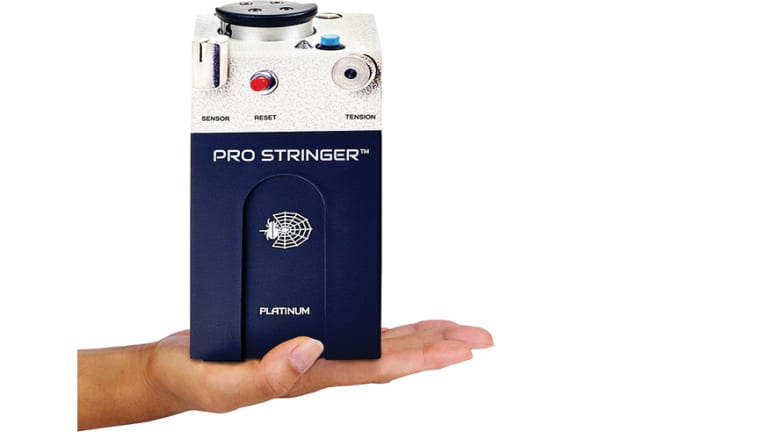In their first full year on tour, New Zealander Rubin Statham and his twin brother, Oliver, spent $16,000 on racquet stringing. In their second year, they bought their own (supposedly) lightweight machine, but got tired of assembling it and lugging it around while paying hefty baggage fees. Then Rubin met Jemin Yao, an engineer, at a tournament in Korea.
The duo began a four-year mission to build the ultimate portable stringer. It had to string precisely, it had to be quick and it had to be small. After numerous prototypes, the Pro Stringer was born. It’s seven inches tall, three-and-a-half inches wide and the main unit (on its own) weighs just a hair over four pounds.
To use the Pro Stringer you need a flat surface so you can clamp the racquet holder. The device itself comes flush against the racquet frame when it pulls the string to tension. Then you simply clamp, release and repeat. The Pro Stringer comes with a soft case that looks like it’s made for a mini ukulele. Stuff the stringer and its power cable, clamps, screws and clips into the bag and you’ve got a nearly nine-pound, mobile racquet repair shop. Rubin can string a frame with the Pro Stringer in just 14 minutes.
“I’ve strung racquets on the train, on the bus; I’ve strung in a bathroom,” Rubin says. “It’s more efficient, it’s more comfortable, it’s faster when you get used to it. You can sit down.”
Tournaments don’t provide free stringing for players. Stars like Roger Federer pay top-flight stringers to handle all of their gear on the road, while the next tier of players pay stringers at the tournament site (the going rate is around $35 a racquet). But for tour rookies, doubles players and journeymen, stringing eats up precious income.
Rubin, 28, is ranked in the 300s but was once as high as No. 279. (Oliver reached a high of No. 711.) In 2009, Rubin won the singles title at an ITF Pro Circuit Futures tournament in Australia. He helped the overwhelmed tournament stringer clear a backlog of racquets with his Pro Stringer and earned more money stringing racquets than he collected in prize money.
COST $790
WEIGHT 4.4 lbs
SIZE 6.7 × 3.5 × 3.5 in.
TENSIONING 30 to 75 lbs
Rubin released a prototype of an electronic model ($1,390) with a digital interface and self-calibration mode in January 2015. The 300 machines he produced sold out quickly, and the company is now making improvements and planning to release a new version soon. Rubin, who offers discounts to players with an ATP, WTA or ITF ranking, says about 500 players are using his device.
Rubin owns Pro Stringer and pays Yao to make the machines, which are produced in a Korean factory. So far, he has found only one surprising flaw with his product: Its small, rectangular size and red button occasionally alarm airport security.
“They say, ‘That’s not a stringing machine,’” Rubin says.
Learn more about the Pro Stringer.
